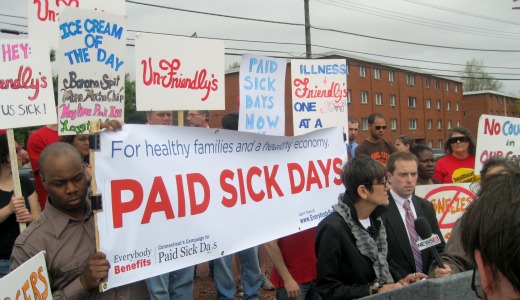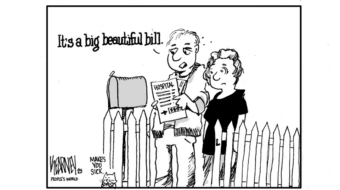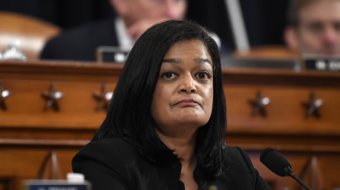
NEW HAVEN, Conn. – As health care and workers’ rights issues are being battled out in state legislatures across the country, a national precedent was set here last week in the final hours of this state’s 2011 session. Lawmakers here passed measures allowing paid sick days and the expansion of health care coverage.
Although hotly contested by insurance and big business lobbyists, legislators could not ignore the strong and vocal grass roots support from communities across the state.
Paid sick days is on the agenda of several state legislatures this year, as part of a campaign coordinated by the National Partnership for Women and Families to win federal legislation. Since 2004, Rep. Rosa DeLauro, D, Conn., has introduced the Healthy Families Act in the House of Representatives to enable 40 million workers now uncovered to earn up to one hour of paid sick leave for every 30 hours worked, a total of seven paid sick days a year.
In a last ditch effort to stop passage in Connecticut, McDonald’s and Wal-Mart sent teams of lobbyists to Hartford who worked furiously to sway legislators that the bill would cost jobs. They were outweighed by a big presence of low-wage workers, union members, clergy and community activists organized by the Everybody Benefits coalition and the Connecticut Working Families Party.
Day care workers, restaurant workers and home health aides wrote letters, made calls and gave testimony about their own experiences when becoming sick and having to choose between going to work and spreading disease or losing pay and possibly getting fired. They convinced legislators that the bill, which covers hundreds of thousands of service workers in the state at companies with 50 or more employees, would be good for the health of the state and for the economy.
Paid sick leave passed the State Senate with a one-vote margin, and then passed the House last week by a 76-65 vote after 11 hours of debate.
“Connecticut should be proud of its legislature for providing paid sick days that recognize and respect the dignity of work,” said Wade Henderson, president and CEO of The Leadership Conference on Civil and Human Rights, based in Washington, DC.
Henderson noted, “This groundbreaking legislation stands for the fundamental principle that no worker should ever be penalized for becoming ill or needing time off to care for a sick family member. The civil and human rights community hopes that other states – including those engaged in destructive efforts to eliminate workers’ rights that helped to build a strong middle class – will take note and follow suit.”
Connecticut’s state legislature and entire Congressional delegation is now majority Democrat including the state’s governor, Dan Malloy. Supporters note this was due to a full year of an all-out campaign and door-to-door canvass by labor and its allies in 2010. Voters rejected Tea Party Republican candidates for U.S. Senate and Congress, and its governor.
However, corporate lobbyists were able to block important pro-worker legislation including a higher tax rate for top incomes. As a result, state workers were forced into a position of accepting $1.6 billion in concessions over two years or facing massive layoffs. A bill that would outlaw captive audience meetings by employers intended to thwart union organizing passed the House, but was blocked from coming up for vote in the Senate.
Referring to the paid sick days bill, Jon Green, executive director of the Connecticut Working Families emphasized, “It isn’t easy. But with committed supporters and a passion for justice, it turns out that it’s still possible to make strides for ordinary people — even against a national backdrop of attacks on basic rights like Medicare and workplace protections.”
Several other pieces of progressive legislation passed narrowly after many hours of debate, including a bill to implement Sustinet health care reform. In April, after Governor Malloy indicated he wanted to wait until next year, hundreds of clergy, labor and community leaders, health care providers and small business owners demonstrated at the capitol building demanding that the bill must pass in this session.
“The universal health care movement is alive and well in Connecticut,” said Juan A. Figueroa, president of the Universal Health Care Foundation. “The passage of this bill and other key health reform measures this year is the result of strong legislative leadership and the efforts of a broad-based coalition,” he said.
Figueroa concluded, “Thanks to today’s vote, our state will take proactive steps to contain health care costs and explore alternatives to the current for profit health care market including a public option.”
As working people in Wisconsin, Ohio, Florida and other states battle to stop massive anti-worker measures, Connecticut’s progressive victories serve to inspire confidence and encourage new approaches.
The passage of the first state single-payer health care program in Vermont also gives leverage to other states as the battles to achieve universal health care continue.
Photo: Rep. Rosa Delauro, D-Conn., speaks in support of paid sick days at press conference in West Haven, Conn, April 27. (Art Perlo/PW)










